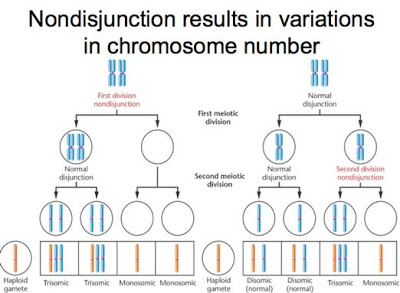Why does nondisjunction cause mutation?
1 Answer
Nondisjunction is the failure of homologous chromosomes or chromatids to segregate during mitosis or meiosis. Nondisjunction during mitosis can result in cancer. Nondisjunction during meiosis results in one daughter cell having both of a pair of parental chromosomes with the other having none. It causes a mutation in the number of chromosomes, either extra chromosomes or missing chromosomes.

Nondisjunction during meiosis can cause chromosomal disorders, such as trisomy 21 (Down syndrome), Turner's syndrome, and Klinefelter's syndrome.
Trisomy 21, also called Down syndrome, occurs when an individual inherits three copies of chromosome 21, rather than the usual two. An affected individual has 47 chromosomes rather than the normal 46. Trisomy 21 occurs due to the nondisjunction of chromosome 21 during meiosis. It can occur during either the formation of ova or spermatozoa, resulting in an ovum or sperm cell with 22 chromosomes, and which lacks a chromosome 21, and another with 24 chromosomes, which has an extra copy of chromosome 21. When a normal sperm cell or ovum unites with a sperm cell or ovum with an extra copy of chromosome 21, the result in the zygote is trisomy 21. Refer to the following site to learn about the effects of trisomy 21. http://en.wikipedia.org/wiki/Down_syndrome
Turner syndrome occurs due to the nondisjunction of the sex chromosomes during meiosis. It is a monosomy of the X sex chromosome. The affected individual has 45 chromosomes with only one X chromosome. The sex genotype is XO. Refer to the following site to learn about the effects of Turner syndrome.
http://en.wikipedia.org/wiki/Turner_syndrome


